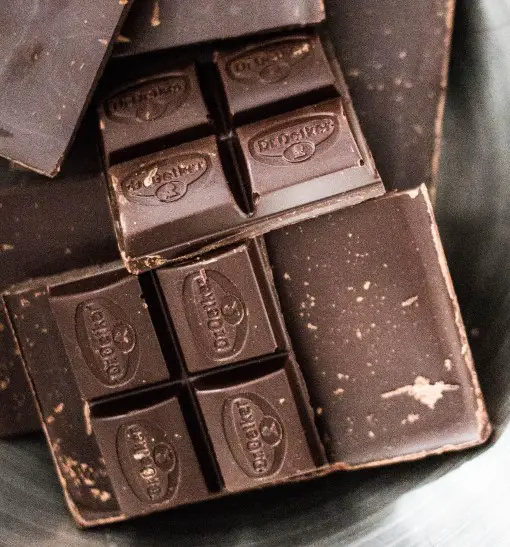
7 Foods to avoid when having insomnia
By Jason Wooden, PhD
If you’re thinking about foods to avoid when having insomnia, it’s more serious than you might realize. Whether you’re an occasional or frequent insomniac, what you eat in the evening can cause or worsen sleep issues if you’re not careful.
Some food types can cause uncomfortable digestive issues while others may more directly get you wired up: caffeine-rich dark chocolate sweets, spicy foods, refined carbs, protein-rich and fatty foods, aged foods, and alcohol.
To avoid food-related insomnia, you should also keep sleep-friendly snacks on hand and focus on healthy food habits.
1) Why we worry about foods to avoid when having insomnia
We’ve all been there at some point, feeling miserable and wondering which foods to avoid when fighting insomnia.
Perhaps, it started with you having a hard time falling asleep and getting the late-night munchies. You reach for your favorite snack, a bowl of chocolate ice cream, and afterwards you’re evening more wired up.
Or maybe, you got home late, reheated a quick bowl of delicious chili, and went to bed anticipating a great night of Z’s. Instead, your chest lights up with heart burn causing you to toss and turn for hours.
In either case, it’s all the same – you ate something that came back to haunt your sleep.
Every night, 1 in 3 Americans struggle with sleep for various reasons and wake up sleep deprived. Eating the wrong things at night is the culprit for some.
Practicing good sleep hygiene is essential to quality sleep and that certainly includes what you feed your body.
As delicious as that bowl of chocolate ice cream or chili might seem, you may be sabotaging your efforts to get decent sleep.
Bottom line, whether you’re an occasional or frequent insomniac, what you eat in the evening can make a bad situation worse if you’re not careful.
2) Three ways food can screw up your sleep
We’ve all heard at some point, “you are what you eat”.
When thinking about foods to avoid when having insomnia, it’s no less true – your sleep is what you eat.
Here are some the ways what you eat can keep you from a good night of rest:
Digestive issues
It’s hard to sleep when you’re uncomfortable from indigestion, constipation, heartburn, or nausea.
With over 60 million people in the US dealing with various digestive ailments each year, its not surprising that some of them have sleep problems.
In fact, a recent study involving 5792 subjects found a strong association between digestive symptoms and sleep problems.
Did you know that 20% of the US populations deal with heartburn and acid reflux?
And that 1 in 4 people deal with indigestion?
Eating the wrong stuff in the evening can trigger nagging digestive issues that stick around throughout the night.
Learn more about heartburn triggers
Anxiety
Whether your just worried about the next day or living with an anxiety disorder, having a racing mind is bad for sleep.
Anxiety is a known sleep killer, whether occasional or ongoing. It can cause sleep problems and make existing ones worse.
Did you 18% of the US population are affected by anxiety disorders every year? Globally, 1 in 3 suffer from anxiety.
For better sleep, it’s important to avoid anything that can cause or worsen anxiety.
It turns some foods can actually increase anxiety.
Alcohol can change the levels of the feel-good chemical serotonin and neurotransmitters in the brain. Caffeine can also trigger anxiety, but may also affect the levels of the serotonin.
Some people have even found avoiding sugar helpful as it may be an anxiety trigger.
Learn more about foods that trigger anxiety
Food intolerances
A food intolerance is when your body has problems digesting certain types of foods such as dairy or grains with gluten. It can also happen when food causes gas build up.
Up to 20% of the world’s population may have a food intolerance.
Unlike a food allergy, a food intolerance does not trigger the immune system.
Symptoms are varied, but can include abdominal pain, acid reflux, diarrhea, migraine headaches, and nausea.
It’s pretty obvious how these can keep you up at night.
Figuring out whether you have a food intolerance can be tricky, but it’s important to identify and eliminate any foods that cause night time sleep problems.
3) Foods to avoid when fighting insomnia
Okay, we’ve talked about the ways that food can mess with your sleep.
Let’s go through the foods to avoid when having insomnia, whether it’s an occasional or ongoing issue for you.
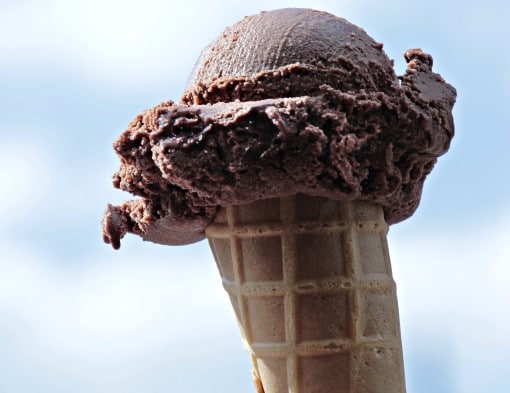
Caffeinated foods
The health effects of caffeine are well documented. It blocks adenosine, the chemical in your brain that promotes sleepiness.
Even five hours after consuming it, quite a bit can still be in your body to cause sleep problems.
While people think about the caffeine in coffee or tea, many overlook the caffeine in their favorite chocolate snack. A dark chocolate bar can have up to 30 mg of caffeine and while a cup of coffee flavored ice cream can have over 45 mg!
Even regular chocolate ice cream has some caffeine (around 3 mg) which can still become a problem if you eat too much of it or are extra sensitive to caffeine.
Some foods to avoid: coffee, mochas, caffeinated sodas, hot cocoa, dark chocolate bars, coffee-flavored or dark chocolate ice cream

Alcohol
Have you ever had a late-night glass of wine to help you relax and fall asleep? Unfortunately, it can come back to haunt you later.
Alcohol may initially make you drowsy, but it can disrupt sleep during the night and keep you from entering the deep restorative phases of your sleep cycles. That’s not good for insomniacs who need as much restful sleep as they can get.
Some foods to avoid: beer, wine, and other alcoholic beverages
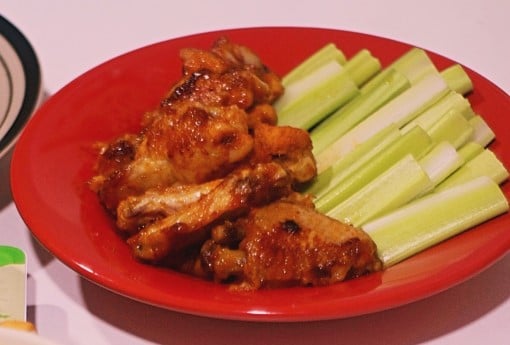
Spicy foods
Buffalo hot wings, New Orleans gumbo, five-alarm chili, chicken Pad Thai, tacos carne asada, curry chicken – what’s not to like?
These and other spicy foods are well-known for causing heartburn, indigestion, and acid reflux.
Unfortunately for insomniacs, lying down can actually worsen heartburn and acid reflux.
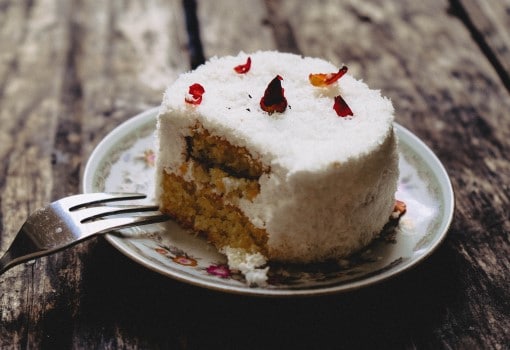
Refined carbs
Sugar and other refined grains can spike your blood with sugar, causing energy levels to be out of sync.
Did you know the sugar consumed during the day may pull you out of deep sleep during night?
Also, there’s growing evidence that refined carbs promote inflammation which can also cause sleep problems.
Some foods to avoid: sugar, white bread, white rice, pasta, and other refined carbs

Natural diuretics
Did you know a water melon is over 90% water?
Foods with a high water content can keep you up at night going to the bathroom. Try and have them earlier in the day.
Some foods to avoid: cantaloupe, celery, oranges, peaches, strawberries, water melon
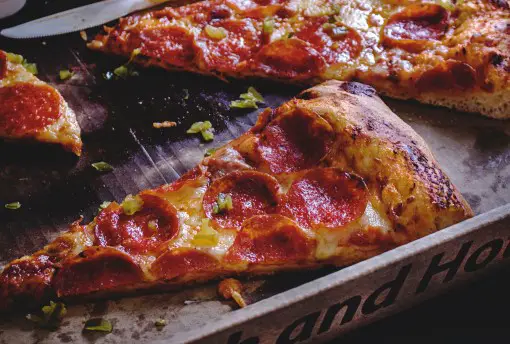
Foods high in protein and fat
It’s takes your body longer to digest protein-rich meals which can distract you from sleep. Fat can cause a buildup of stomach acids which also cause problems for sleep.

Aged, cured, fermented, and smoked food
These foods have high amounts of tyramine, a byproduct of the break down of the amino acid tyrosine. Tyramine can trigger the brain to release norepinephrine, a stimulant that can increase brain activity and delay sleep.
There’s also a lot of histamine, a neurotransmitter that can cause anxiety and insomnia in some people.
Some foods to avoid: cheese, pickles, salami, sauerkraut, cured and smoked meats
4) Bedtime snacks that can help your sleep
We’ve talked about the foods to avoid when having insomnia, so let’s look at some alternatives for when you get the late-night munchies.
To avoid getting hungry at bedtime, experts recommend eating regular nutritious meals during the day. They also say to keep healthy snacks on hand.
Here are some options that have nutrients which have been shown to be beneficial for sleep and may also help with managing your insomnia.
Melatonin-rich snacks
Melatonin is the hormone that tells your body its time to sleep, increasing when its dark and decreasing when it’s light.
Melatonin supplements have become very popular, but why not try a natural source?
What to try: almonds or almond milk, cherries, pomegranate, oats, mixed nuts & seeds
Tryptophan-rich snacks
Tryptophan, an amino acid found in protein, is used by the body to make the neurotransmitter serotonin. The serotonin is then used to make melatonin.
Studies have linked dietary tryptophan intake to sleep duration and tryptophan supplementation has been found to improve sleep.
What to try: low-fat yogurt, apples, avocado, bananas, peaches, mixed nuts & seeds
Calcium-rich snacks
In the brain, calcium helps the body make melatonin from tryptophan.
Calcium intake has been associated with poor sleep and calcium rich diets have been shown to help insomnia.
What to try: low-fat yogurt, apples, avocado, bananas, peaches
Magnesium-rich snacks
Magnesium is another mineral that’s important for sleep and acts as a natural relaxant to help turn off the adrenaline.
Magnesium supplementation was found in a clinical study to improve sleep.
What to try: low-fat yogurt, avocados, bananas, mixed nuts & seeds
Vitamin B-rich snacks
The B-complex vitamins play a role in moods and sleep. Lower consumption of vitamin B-6 has been tied to insomnia.
What to try: low-fat yogurt, avocados, bananas, citrus fruits, mixed nuts & seeds
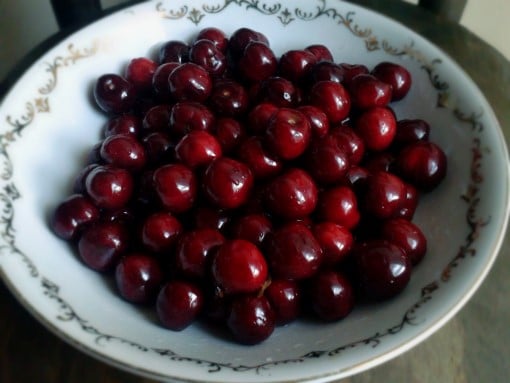
Dark cherries
Nutrients: melatonin
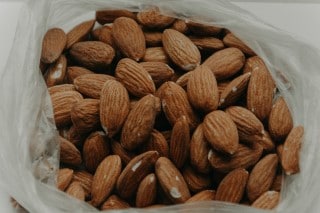
Almonds
Nutrients: melatonin
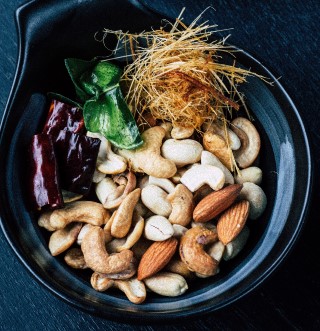
Mixed nuts
Nutrients: magnesium, melatonin, tryptophan
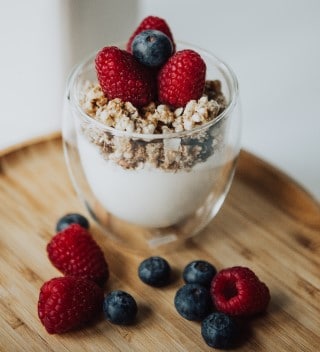
Yogurt with fruit and granola
Nutrients: calcium, magnesium
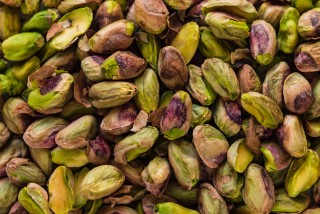
Pistachios
Nutrients: vitamin B
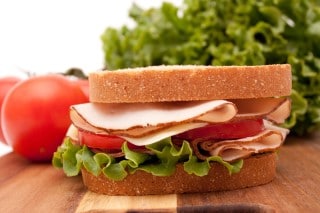
Lean turkey on whole wheat
Nutrients: tryptophan
5) Why you need to focus on food habits
For many things in life, habits are the key to success.
That’s because when you eat and what you eat each day that can help make a difference with managing insomnia.
So, if you’re serious about foods to avoid when having insomnia, you need to look at your food habits.
For starters, you should identify the reasons you snack late at night.
Is it boredom, depression, stress or some other issue?
You can then work on developing food habits that can help you avoid food-related insomnia:
- plan your meals
- eat regular meals
- eat dinner at least 3 hours before bedtime
- stay away from food that may provoke digestive issues
- keep junk food out of the house
- keep healthy snacks on hand
- avoid mindless snacking in front of the TV
What to Remember:
- Foods to avoid when having insomnia is important part of sleep hygiene
- Eating the wrong food can cause or worsen your sleep
- Change your habits surrounding food
- Try healthy snacks that support good sleep
You may also be interested in:
Sources:
1. “Digestive Diseases Statistics for the United States”, NIH website
2. Association between digestive symptoms and sleep disturbance: a cross-sectional community-based study, BMC Gastroenterol. 2019; 19: 34.
3. “Definition & Facts of Indigestion”, NIH website
4. “Facts & Statistics”, ADAA website
5. “Globally, 1 in 13 suffers from anxiety”, 2012, Futurity.org.
6. “The 5 Worst Foods for Your Anxiety”, Healthline.com
7. The Differential Diagnosis of Food Intolerance, Dtsch Arztebl Int. 2009; 106(21): 359–370.
8. “12 Surprising Sources of Caffeine”, 2015, Health.com
9. “Sweet Dreams: How Sugar Impacts Your Sleep”, National Sleep Foundation website
10. “6 Foods That Cause Inflammation”, Healthline.com
11. “7 Ways Inflammation Is Affecting Your Sleep”, 2018, Bustle.com
12. Tryptophan Intake in the US Adult Population Is Not Related to Liver or Kidney Function but Is Associated with Depression and Sleep Outcomes, J Nutr. 2016, 146(12):2609S-2615S.
13. Effects of L-tryptophan on sleepiness and on sleep, J Psychiatr Res. 1982-1983, 17(2):107-13.
14. Sleep Symptoms Associated with Intake of Specific Dietary Nutrients, J Sleep Res. 2014, 23(1): 22–34.
15. The effect of magnesium supplementation on primary insomnia in elderly: A double-blind placebo-controlled clinical trial, J Res Med Sci. 2012, 17(12):1161-9.
16. Plasma pyridoxine deficiency is related to increased psychological distress in recently bereaved homosexual men, Psychosom Med. 1998, 60(3):297-308.
Connect with us:
About Us
Better Sleep Simplified® was founded as a place for you to get clear and well-researched information.
Our goal is to make sure you know about your options so that you take action sooner rather than later.
Check us out on YouTube:
Watch and Learn
Helpful sleep tips, interesting sleep facts and statistics you want to know about
Affiliate Disclosure
This site is a participant in the Amazon Services LLC Associates Program and other affiliate advertising programs designed to provide a means for sites to earn advertising fees by advertising and linking to them.
Important: BetterSleepSimplified.com is for informational purposes only and is not intended or implied to be a substitute for professional medical advice, diagnosis, or treatment. Always consult a physician for sleep and health concerns. See additional information.
